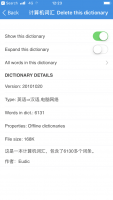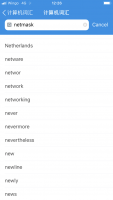You are using an out of date browser. It may not display this or other websites correctly.
You should upgrade or use an alternative browser.
You should upgrade or use an alternative browser.
Computer/Technical/Network dictionary recommendations?
- Thread starter pdwalker
- Start date
I don't know if there is such a dictionary, as I learned mostly from my colleagues.
Here (Taiwan) most of the people actually use the english words. I even discussed the fact that in French we have our own say to say "Firewall" and they were very surprised, as they didn't even know if there was a chinese word for it. I think that's because most of the IT classes at university are taught in English.
I'm trying to use the chinese words when possible (伺服器), but it looks like a lot of words are only said in English (request, ping, script...)
Here (Taiwan) most of the people actually use the english words. I even discussed the fact that in French we have our own say to say "Firewall" and they were very surprised, as they didn't even know if there was a chinese word for it. I think that's because most of the IT classes at university are taught in English.
I'm trying to use the chinese words when possible (伺服器), but it looks like a lot of words are only said in English (request, ping, script...)
Shun
状元
I think the idea of an IT dictionary was mentioned in the thread where users could wish for a new, Pleco-curated dictionary. So if there already was one, Mike or someone else would probably have said so.
I agree it would be nice to have a comprehensive resource, though I guess the combination of English-speaking Chinese learner and IT specialist, which would be the target audience for such a dictionary, isn't all that common. People who are proficient in these two areas could almost be expected to be able to figure it out on their own using Google/Baidu and the other available dictionaries.
Just for fun, I checked Pleco's other dictionaries, IP address is, as one would expect, none other than "IP地址", the word firewall is the same as for a real firewall, namely "防火墙", or long "电脑网络防火墙", server is "服务器", and netmask is "掩码" or "IP地址掩码“. So you can already piece together something. Perhaps you know the trick whereby you look up a term in Wikipedia, then switch to the Chinese language Wikipedia. Then you can google it if needed and see if Baidu Baike's definition agrees with the meaning you're looking for. For netmask, I first found "subnetwork" in Wikipedia, switched to Chinese, looked for the netmask term and verified it with Baidu Baike.
François is quite right, of course, one should be able to get by with the English terms in most everyday situations. But I agree that it's nice to be able to understand it with certainty when someone uses the Chinese variant.
I do have a set of 75 flashcards with mostly basic IT terms, pretty general ones, but perhaps still useful. FWIW, I include it here.
I agree it would be nice to have a comprehensive resource, though I guess the combination of English-speaking Chinese learner and IT specialist, which would be the target audience for such a dictionary, isn't all that common. People who are proficient in these two areas could almost be expected to be able to figure it out on their own using Google/Baidu and the other available dictionaries.
Just for fun, I checked Pleco's other dictionaries, IP address is, as one would expect, none other than "IP地址", the word firewall is the same as for a real firewall, namely "防火墙", or long "电脑网络防火墙", server is "服务器", and netmask is "掩码" or "IP地址掩码“. So you can already piece together something. Perhaps you know the trick whereby you look up a term in Wikipedia, then switch to the Chinese language Wikipedia. Then you can google it if needed and see if Baidu Baike's definition agrees with the meaning you're looking for. For netmask, I first found "subnetwork" in Wikipedia, switched to Chinese, looked for the netmask term and verified it with Baidu Baike.
François is quite right, of course, one should be able to get by with the English terms in most everyday situations. But I agree that it's nice to be able to understand it with certainty when someone uses the Chinese variant.
I do have a set of 75 flashcards with mostly basic IT terms, pretty general ones, but perhaps still useful. FWIW, I include it here.
Attachments
pdwalker
状元
Francois,
I'm not surprised that Taiwan tends to use the English equivalents. The same is true here in Hong Kong.
I was thinking more of the mainland where they do use terms like IP地址 for IP Address. I should have stated that specifically. My bad.
Another place I could look is in Mainland Chinese software. There is where I think I may be able to find their preferred terms.
Shun,
Thank you. I'll start with your list and see how Pleco fills it out.
And I was doing something similar - doing backwards and forwards searches of terms to see if I could determine what the "correct" Simplified Chinese terms were for some of the English IT related words.
I was hoping to be lazy and build on the work of others. Looks like I might as well get started on it. I'll share the results as I develop it.
I'm not surprised that Taiwan tends to use the English equivalents. The same is true here in Hong Kong.
I was thinking more of the mainland where they do use terms like IP地址 for IP Address. I should have stated that specifically. My bad.
Another place I could look is in Mainland Chinese software. There is where I think I may be able to find their preferred terms.
Shun,
Thank you. I'll start with your list and see how Pleco fills it out.
And I was doing something similar - doing backwards and forwards searches of terms to see if I could determine what the "correct" Simplified Chinese terms were for some of the English IT related words.
I was hoping to be lazy and build on the work of others. Looks like I might as well get started on it. I'll share the results as I develop it.
John.
秀才
There is an English-Chinese dictionary called "计算机词汇". It contains 6131 IT related entries. Its most severe downside is its age, it has been released in 2006 or earlier. Also I can't say much about the reliability of the dictionary. However it seems as if it contained many useful entries.
The dictionary is available as a StarDict file. Due to possible copyright infringements it can't be recommended to just search for the file in the internet and download it. The file "stardict-kdic-computer-gb-2.4.2.tar.bz2" should absolutely be obtained legally. Using the StarDictEditor this file can be converted to a text file. The text file can be imported into pleco as a user dictionary.
I also found a dictionary file called "计算机与网络英汉对照词典" with 831 English-Chinese IT related entries. It seems newer and more specialised. It is freely available here.
The dictionary is available as a StarDict file. Due to possible copyright infringements it can't be recommended to just search for the file in the internet and download it. The file "stardict-kdic-computer-gb-2.4.2.tar.bz2" should absolutely be obtained legally. Using the StarDictEditor this file can be converted to a text file. The text file can be imported into pleco as a user dictionary.
I also found a dictionary file called "计算机与网络英汉对照词典" with 831 English-Chinese IT related entries. It seems newer and more specialised. It is freely available here.
Last edited:
Shun
状元
Many thanks, very nice. I have the Eudic app on my iPhone (also available for Mac, Windows I don‘t know), and it seems to have the same dictionary for free download, though unfortunately its vocabulary includes a lot of words which might be used together with computing, but which themselves have no connection to IT. See the screenshots:


So no netmask, unfortunately, even though that term must be 35 years old by now. But thanks, it surely has its uses!
Edit: The second one you added, seems to be as good as it gets.


So no netmask, unfortunately, even though that term must be 35 years old by now. But thanks, it surely has its uses!
Edit: The second one you added, seems to be as good as it gets.
Last edited:
pdwalker
状元
Thanks for all those references. That's a helpful start.
Next question, tangentially related, aimed more at Mike
Is it possible to have a bi directional user dictionary? Or are the user dictionaries one way - and thus I'd have to create two one way user dictionaries.
e.g. Imagine I've got my nice list of tech words like so:
IP地址 IP Address <some english definition>
IP Address IP地址 <some chinese definition>
Would I set this up as 1 or 2 user dictionaries? (cn->en, en-cn) or could it be done as one?
Next question, tangentially related, aimed more at Mike
Is it possible to have a bi directional user dictionary? Or are the user dictionaries one way - and thus I'd have to create two one way user dictionaries.
e.g. Imagine I've got my nice list of tech words like so:
IP地址 IP Address <some english definition>
IP Address IP地址 <some chinese definition>
Would I set this up as 1 or 2 user dictionaries? (cn->en, en-cn) or could it be done as one?
Shun
状元
Hi pdwalker,
I re-read some threads, I‘d say I‘d just do it as one Chinese-to-English dictionary. In the other direction, you just do a full-text search, and Flashcards supports both directions with Chinese-English data anyway. So as I see it, there‘s not really a need for an English-Chinese user dictionary.
Looking forward to it!
Cheers, Shun
I re-read some threads, I‘d say I‘d just do it as one Chinese-to-English dictionary. In the other direction, you just do a full-text search, and Flashcards supports both directions with Chinese-English data anyway. So as I see it, there‘s not really a need for an English-Chinese user dictionary.
Looking forward to it!
Cheers, Shun
Would I set this up as 1 or 2 user dictionaries? (cn->en, en-cn) or could it be done as one?
Sorry I didn't see this when you posted it originally 
Closest you could get to this at the moment would be a full-text english in a Chinese-English dictionary. In theory we could accommodate a dictionary that went both ways in 4.0 but we haven't decided whether to actually enable that yet.
Closest you could get to this at the moment would be a full-text english in a Chinese-English dictionary. In theory we could accommodate a dictionary that went both ways in 4.0 but we haven't decided whether to actually enable that yet.
